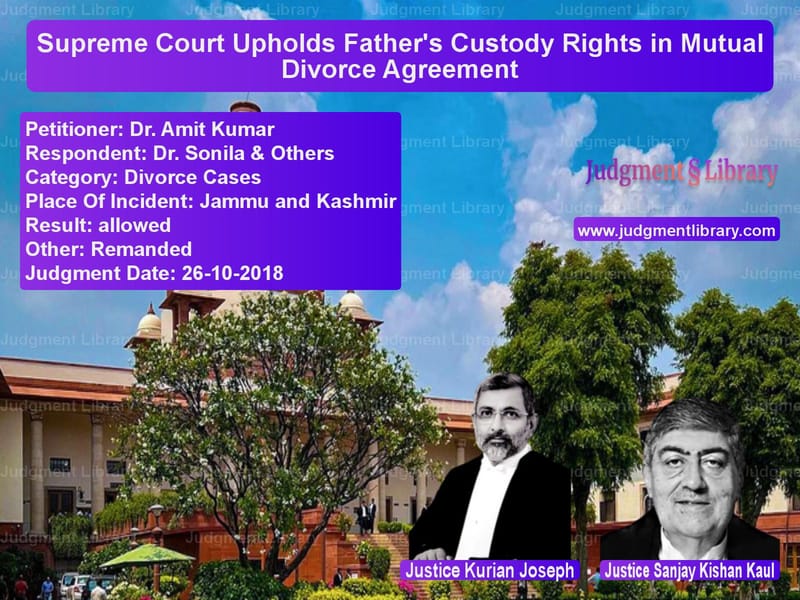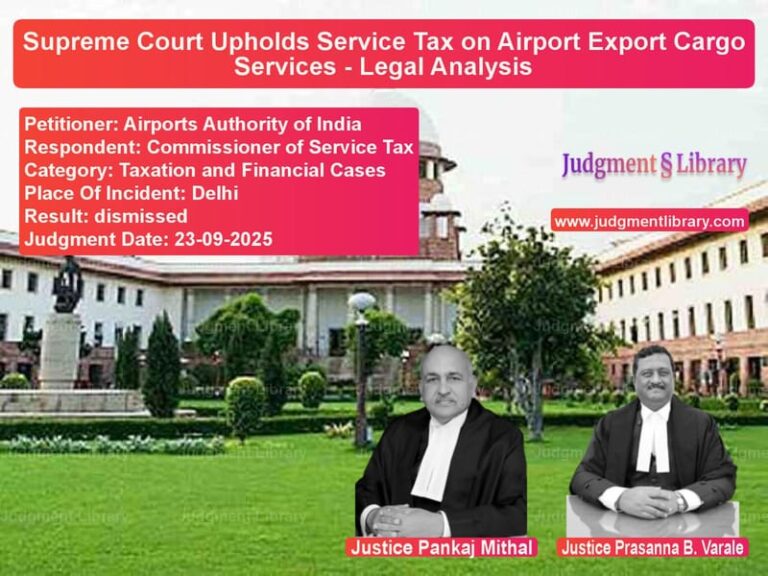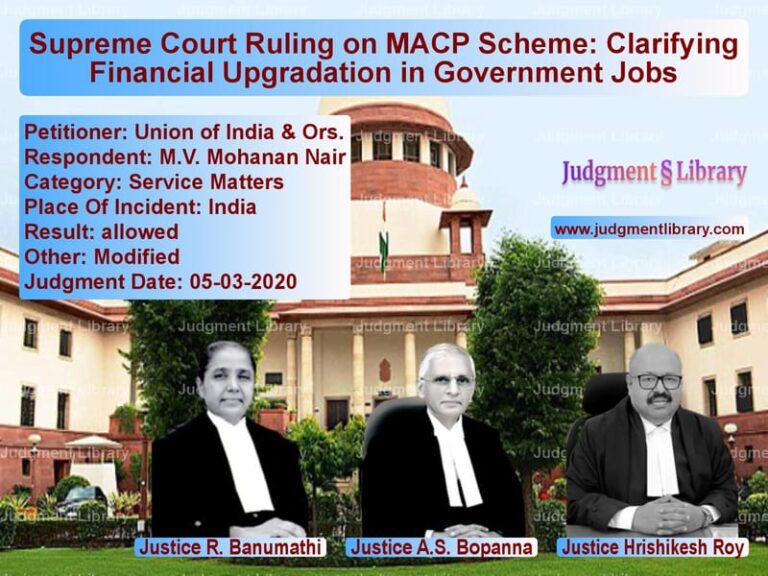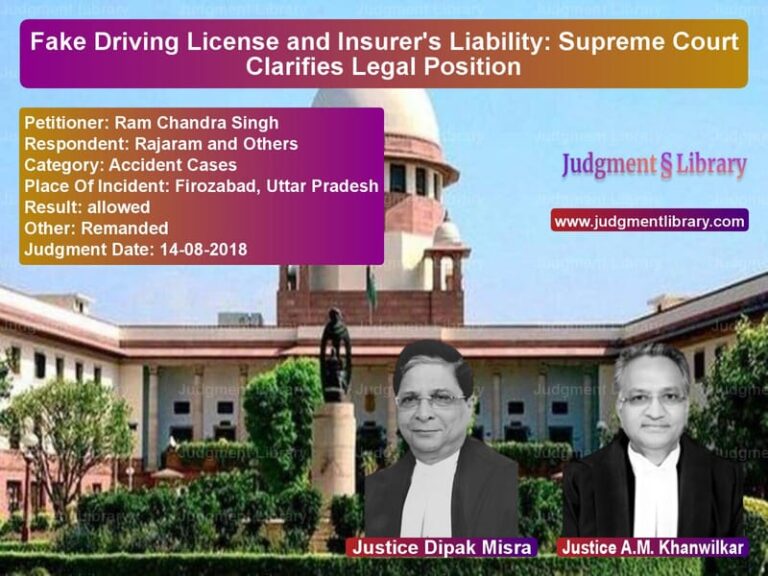Supreme Court Upholds Father’s Custody Rights in Mutual Divorce Agreement
The Supreme Court of India recently ruled on a custody dispute arising from a mutual consent divorce between Dr. Amit Kumar and Dr. Sonila. The case centered on whether the mother could challenge the agreed custody arrangement after signing a consent decree granting custody to the father. The Supreme Court reinstated the original agreement, emphasizing that modifying the decree should only be considered in exceptional circumstances where the welfare of the children is at stake.
Background of the Case
Dr. Amit Kumar and Dr. Sonila, both medical professionals, were married on May 7, 2004. They had two children—a son and a daughter. Due to marital discord, they filed for divorce by mutual consent under Section 13B of the Hindu Marriage Act, 1955. The Family Court granted their divorce on December 9, 2016, after the statutory six-month period.
As part of the divorce settlement:
- Both parties agreed to remarry if they wished, severing their spousal rights over each other.
- The father, Dr. Amit Kumar, was granted custody of both children.
- Each parent agreed to be financially responsible for one child—Dr. Amit Kumar for the son and Dr. Sonila for the daughter.
Initially, the arrangement worked well, but issues arose when Dr. Amit Kumar was transferred to Jammu. He enrolled the children in a boarding school in Pune, as managing their education while fulfilling his professional responsibilities became challenging. The dispute escalated when he sent a legal notice to Dr. Sonila, seeking her financial contribution for their daughter’s expenses, as agreed in the divorce settlement.
Key Issues Raised
- Could Dr. Sonila challenge the custody arrangement after signing the mutual consent decree?
- Did Dr. Amit Kumar’s remarriage affect his custody rights?
- Was the financial arrangement outlined in the divorce decree enforceable?
- Should the children’s preferences be considered in determining custody?
Arguments of the Petitioner (Dr. Amit Kumar)
- The petitioner argued that the custody arrangement was settled in the mutual consent divorce and should not be reopened unless there was clear evidence that it was not in the children’s best interests.
- He contended that Dr. Sonila never contributed financially for their daughter’s expenses, violating the agreed terms.
- The mother’s challenge was motivated by her unwillingness to fulfill financial obligations rather than genuine concern for the children.
- His remarriage did not affect his legal custody rights.
Arguments of the Respondent (Dr. Sonila)
- The respondent claimed that the consent decree was unfairly imposed upon her.
- She argued that she should have a say in major decisions affecting their children, including their education.
- She contended that the children expressed a preference to stay with her.
- She sought a modification of the custody arrangement based on changed circumstances.
Supreme Court’s Analysis
The Supreme Court reaffirmed that the primary consideration in custody disputes is the welfare of the children. However, the Court also emphasized that mutual agreements made in divorce settlements should not be disturbed unless there is compelling evidence that the arrangement is detrimental to the children.
The Court made the following observations:
- The consent decree was entered into voluntarily and after a six-month reflection period.
- There was no substantial evidence proving that Dr. Amit Kumar was failing in his parental duties.
- Dr. Sonila’s primary reason for reopening the case was financial rather than custodial concerns.
- The children’s statements favoring their mother should be considered in context, as they were young and might prefer a more immediate parental presence over long-term stability.
The Court noted:
“Custody arrangements agreed upon in a mutual consent divorce decree should not be modified lightly unless it is demonstrated that the welfare of the children is at risk.”
Final Judgment
The Supreme Court ruled:
- The Family Court’s original custody decision was reinstated.
- Dr. Amit Kumar retained custody of both children.
- Dr. Sonila was directed to honor her financial commitments towards their daughter.
- The matter was closed, preventing further unnecessary litigation.
The judgment concluded:
“Courts must not encourage unnecessary litigation where parties have mutually agreed on child custody in divorce settlements unless there is clear evidence of harm to the children.”
Implications of the Judgment
This ruling has significant implications for family law in India:
- Enforceability of Divorce Settlements: Mutual agreements in divorce must be respected unless the child’s welfare is at risk.
- Parental Financial Responsibility: Parents must honor financial obligations set in divorce decrees.
- Custody Rights and Remarriage: A parent’s remarriage does not automatically disqualify them from retaining custody.
- Child Welfare Considerations: Courts must assess children’s welfare holistically rather than relying solely on their stated preferences.
The Supreme Court’s ruling reaffirms the principle that custody decisions should prioritize long-term stability and welfare over short-term preferences or financial disputes.
Petitioner Name: Dr. Amit Kumar.Respondent Name: Dr. Sonila & Others.Judgment By: Justice Kurian Joseph, Justice Sanjay Kishan Kaul.Place Of Incident: Jammu and Kashmir.Judgment Date: 26-10-2018.
Don’t miss out on the full details! Download the complete judgment in PDF format below and gain valuable insights instantly!
Download Judgment: Dr. Amit Kumar vs Dr. Sonila & Others Supreme Court of India Judgment Dated 26-10-2018.pdf
Direct Downlaod Judgment: Direct downlaod this Judgment
See all petitions in Child Custody
See all petitions in Alimony and Maintenance
See all petitions in Mutual Consent Divorce
See all petitions in Judgment by Kurian Joseph
See all petitions in Judgment by Sanjay Kishan Kaul
See all petitions in allowed
See all petitions in Remanded
See all petitions in supreme court of India judgments October 2018
See all petitions in 2018 judgments
See all posts in Divorce Cases Category
See all allowed petitions in Divorce Cases Category
See all Dismissed petitions in Divorce Cases Category
See all partially allowed petitions in Divorce Cases Category







